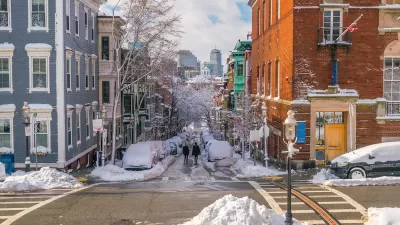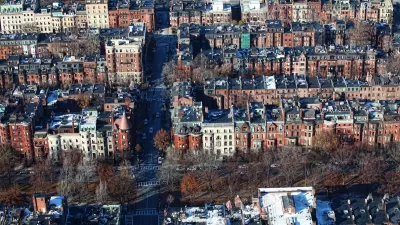Racial segregation in housing is growing and shifting as affluent enclaves form new incorporated cities and options for affordable housing in cities become more limited.

The geography of racial segregation is changing in U.S. cities, according to research by Luisa Godinez-Puig and Sharon Cornelissen for the Joint Center for Housing Studies of Harvard University. “As gentrification and housing unaffordability price lower-income residents out of major cities, we see new racial inequalities emerging on the metropolitan fringe,” they write. Two articles expand on their findings in Atlanta and Boston.
In Atlanta, the creation of new cities, which often occurs in affluent white communities, “can have large impacts on the unincorporated areas they leave behind, which are often communities of color. Indeed, by detaching themselves from county governance, new cities take resources away from the common pool of unincorporated areas and can significantly hurt the economic development of these communities.” Godinez-Puig notes that some predominantly Black communities have also incorporated, in part as a response to other new cities, but that the effects of their incorporation is unclear.
In Boston, the rapidly rising costs of housing are pushing Black families farther out of the city center as “unequal housing choices shape new locations of segregation across metropolitan Boston.” In 2020, the city was ranked 11th most segregated of the top 50 U.S. metros, resulting in disparities in economic and educational opportunities and access to healthcare and jobs. The article asserts that state governments can redress these disparities through preemption laws that promote affordable housing and eliminate exclusionary zoning and a stronger commitment to Affirmatively Furthering Fair Housing and enforcement of the Fair Housing Act.
FULL STORY: The Incorporation of New Cities Has Increased Racial Segregation in Metro Atlanta

Alabama: Trump Terminates Settlements for Black Communities Harmed By Raw Sewage
Trump deemed the landmark civil rights agreement “illegal DEI and environmental justice policy.”

Planetizen Federal Action Tracker
A weekly monitor of how Trump’s orders and actions are impacting planners and planning in America.

How Atlanta Built 7,000 Housing Units in 3 Years
The city’s comprehensive, neighborhood-focused housing strategy focuses on identifying properties and land that can be repurposed for housing and encouraging development in underserved neighborhoods.

In Both Crashes and Crime, Public Transportation is Far Safer than Driving
Contrary to popular assumptions, public transportation has far lower crash and crime rates than automobile travel. For safer communities, improve and encourage transit travel.

Report: Zoning Reforms Should Complement Nashville’s Ambitious Transit Plan
Without reform, restrictive zoning codes will limit the impact of the city’s planned transit expansion and could exclude some of the residents who depend on transit the most.

Judge Orders Release of Frozen IRA, IIJA Funding
The decision is a victory for environmental groups who charged that freezing funds for critical infrastructure and disaster response programs caused “real and irreparable harm” to communities.
Urban Design for Planners 1: Software Tools
This six-course series explores essential urban design concepts using open source software and equips planners with the tools they need to participate fully in the urban design process.
Planning for Universal Design
Learn the tools for implementing Universal Design in planning regulations.
Caltrans
Smith Gee Studio
Institute for Housing and Urban Development Studies (IHS)
City of Grandview
Harvard GSD Executive Education
Toledo-Lucas County Plan Commissions
Salt Lake City
NYU Wagner Graduate School of Public Service





























